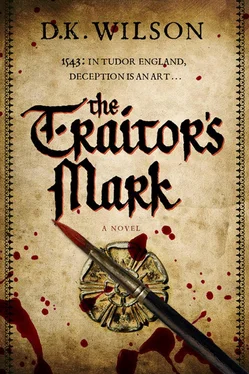D. Wilson - The Traitor’s Mark
Здесь есть возможность читать онлайн «D. Wilson - The Traitor’s Mark» весь текст электронной книги совершенно бесплатно (целиком полную версию без сокращений). В некоторых случаях можно слушать аудио, скачать через торрент в формате fb2 и присутствует краткое содержание. Год выпуска: 0101, Издательство: Pegasus Books, Жанр: Исторический детектив, на английском языке. Описание произведения, (предисловие) а так же отзывы посетителей доступны на портале библиотеки ЛибКат.
- Название:The Traitor’s Mark
- Автор:
- Издательство:Pegasus Books
- Жанр:
- Год:0101
- ISBN:нет данных
- Рейтинг книги:5 / 5. Голосов: 1
-
Избранное:Добавить в избранное
- Отзывы:
-
Ваша оценка:
- 100
- 1
- 2
- 3
- 4
- 5
The Traitor’s Mark: краткое содержание, описание и аннотация
Предлагаем к чтению аннотацию, описание, краткое содержание или предисловие (зависит от того, что написал сам автор книги «The Traitor’s Mark»). Если вы не нашли необходимую информацию о книге — напишите в комментариях, мы постараемся отыскать её.
The Traitor’s Mark — читать онлайн бесплатно полную книгу (весь текст) целиком
Ниже представлен текст книги, разбитый по страницам. Система сохранения места последней прочитанной страницы, позволяет с удобством читать онлайн бесплатно книгу «The Traitor’s Mark», без необходимости каждый раз заново искать на чём Вы остановились. Поставьте закладку, и сможете в любой момент перейти на страницу, на которой закончили чтение.
Интервал:
Закладка:
‘That depends on his grace. He might need my help if he decides to proceed against Moyle immediately. However, the first job is to see exactly what Master Johannes’ message says.’
‘I think, perhaps, I will come with you, at least part of the way. I might be of some use at Hemmings. Like Lizzie, I’m concerned about Adie and the boys. Someone will have to break the news to them about Master Holbein’s death.’
I thought I detected a hint of criticism. ‘Of course … I should have …’
Ned shook his head. ‘No need to reproach yourself, Thomas. I will explain things delicately. You are too far into this business to turn aside for personal reasons.’
I took the portrait, now wrapped in cloth, and had myself rowed across to the Steelyard wharf. When I went in search of Meyer I was told that he was busy. I waited for him in the chapel until almost noon and spent part of the time in prayer for Johannes Holbein. I implored heaven for his safety but whether that might be secured in this world or the next I had to leave in higher hands. The pastor eventually appeared and led me to his office, where I described the events of the previous evening.
Meyer sighed deeply. ‘I suppose he always knew that there could only be one end to this affair.’
‘We must hope for good news until we know for certain what has happened to him. Meanwhile, the best we can do for him is to complete what he began.’ I unwrapped the painting and laid it on the pastor’s desk. ‘This is the message he left for me to pass on. What does it mean?’
Meyer stared at the canvas. ‘What an extraordinary …’
‘Please, can you translate?’ I urged. ‘I’m in a hurry to pass the message on.’
‘Yes, of course. Exquisite handwriting. So much talent. What a waste.’
‘The translation?’ I tried not to shout.
He took a sheaf of paper from a shelf and handed it to me. ‘There’s pen and ink beside you,’ he said. ‘If I read perhaps you would like to write.’
The words pastor Meyer dictated were as follows:
Visits of this man to the Duke of Norfolk
15 December, 1541, Kenninghall. Visitor says we are delaying our plans. You must beg forgiveness of his majesty and avoid being arrested like others of your family. We cannot proceed without you
20 May, 1543, Whitehall. Visitor says you must draw his majesty’s attention to the Windsor heretics … Our friends in Canterbury are ready to spring the trap
20 August, 1543, Whitehall. Visitor says everything is ready for the purge in Essex and Kent. My agents need more money. The pope will grant absolution …
‘That is the end’, Meyer said. ‘Who is this-man who gives orders to your duke?’
‘Someone who conceals his power extremely well,’ I replied.
At Ned’s house all was ready for our departure, including a simple meal packed by our host that we could eat as we travelled. The only task we had to perform was to make copies of Holbein’s notes and his painting of the heraldic device. As I worked, Ned sat opposite me at the table.
‘Strange to think of the Duke of Norfolk taking orders from a social inferior,’ he said. ‘Such a proud man.’
‘They are both in the service of Emperor Charles and the pope. That, I suppose, levels out lesser distinctions of rank. As covert Catholics, I imagine they enjoy your sympathy, Ned.’
‘That’s an unjust taunt, my friend.’
‘I mean no insult by it. I’m intrigued to know what you really think of a man like Thomas Moyle.’
‘I have never been able to understand how violence, militancy and treason can be squared with the Christian profession,’ he said. ‘By all accounts this Moyle has always been a duplicitous creature. In time past he was one of the most virulent enemies of the religious life. He was a chief commissioner in the campaign to close the monasteries.’
‘Aye, and a zealous supporter of Cromwell. It was only after Cromwell’s fall that he showed his true colours. He knew all about the ex-minister’s network and was in a position to sell his information to Eustace Chapuys, the imperial ambassador.’
‘So it seems we should not think of him as a good Catholic; just an ambitious, self-serving scoundrel who believes in nothing but his own advancement.’
I laid aside the quill. ‘Do you have a sharper pen, Ned? This one is beginning to blotch badly. If Moyle believes in nothing but Moyle, his religion has served him well. He’s made a rich marriage with the daughter of one of the leading goldsmiths and his control of the Court of Augmentations must bring him in hundreds by the year.’
Ned signed. ‘I have often noticed one characteristic of successful men: however much they have, it is seldom sufficient.’
‘Well, this time he has reached for one prize too many. This’ – I collected together my notes – ‘will bring about his downfall. Let us be on our way to lay the evidence before Archbishop Cranmer.’
Bart begged to be allowed to accompany us and there seemed no good reason to deny him. We rode into the main courtyard at Croydon Palace just as the last sunlight was drenching the tiled roofs. The household was at supper in the great hall and we were bidden to join them. Afterwards I was escorted to Ralph Morice’s office.
The secretary listened with mounting excitement as I recounted my meetings at Woodstock and Bridewell.
‘Johannes has sacrificed himself in a great cause,’ he commented. ‘The archbishop will include him in his prayers. He is a lesson to us all in dedication to God’s truth.’ He laid out my notes on his standing desk and studied them carefully.
‘I had no dyes to represent the heraldic shield fully,’ I explained, ‘but I have written in the colours.’
‘Have you brought the painting with you? I’d like to see it.’
I sent a message to Dick and within minutes he came with the wrapped canvas. I unpacked it and set it on a stool placed against the wall.
‘There is much sadness in those eyes,’ Morice said quietly. Then, more briskly, ‘His grace will want to see this. He reads German very well – not that I doubt that this translation is excellent. It will be good to have the shield copied in colour. We have someone here who can do it in water-paint. Let me see if I can recall how the heralds would describe it … “On a ground or, a chevron jules, between three moles sable”. I think that’s right. Personally, I dislike such gaudy, self-glorifying display.’ He picked up the portrait and strode to the door. ‘His grace should have finished supper now. I’ll go and report to him. Please wait here; I know he’ll want to talk to you himself.’
He was gone a long time. The last twenty-four hours had been tiring. The lamplight was soft. The fire gave off a comforting heat. My head drooped.
‘So, if you’re ready, Thomas …’
I woke with a start.
‘His grace will see you now. He’s in the library. Bring the painting.’
Morice led the way to a long chamber with several book presses standing against the walls. Cranmer was sitting in a high-backed chair at one of the tables. I made my obeisance. The archbishop received it with a nod and a wistful smile. He looked weary and there were shadows around his eyes. He motioned me to a bench opposite.
‘It is good to see you again, Thomas, and may I say how relieved I am that you are safe and well. Ralph has kept me informed of your activities. I appreciate what you have been doing.’
I made some self-deprecating response but the archbishop was now staring at my notes and seemed not to be listening.
‘This is very, very sad,’ he said.
‘I wonder if “sad” is the right word, Your Grace.’
‘You believe I should be angry, indignant, personally offended?’
‘I’m sure I would be.’
Читать дальшеИнтервал:
Закладка:
Похожие книги на «The Traitor’s Mark»
Представляем Вашему вниманию похожие книги на «The Traitor’s Mark» списком для выбора. Мы отобрали схожую по названию и смыслу литературу в надежде предоставить читателям больше вариантов отыскать новые, интересные, ещё непрочитанные произведения.
Обсуждение, отзывы о книге «The Traitor’s Mark» и просто собственные мнения читателей. Оставьте ваши комментарии, напишите, что Вы думаете о произведении, его смысле или главных героях. Укажите что конкретно понравилось, а что нет, и почему Вы так считаете.












